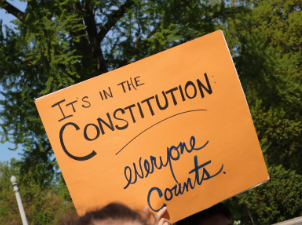
A Fair Census Count in Georgia and Across the Country
Leah Brown
July 20, 2020
The Census is a survey that collects necessary information on every person living in the United States. The invitation arrives in the mail and can be responded to, online, by phone, or email. With over 300 million people to count accurately, everyone must complete the 2020 census. Currently, only 4 out of 10 households have participated in the Census.
Last week, NETWORK Government Relations Advocate Sr. Quincy Howard spoke with Rebecca DeHart of Fair Count, Georgia. To listen to their conversation about the relationship the census has on voting rights and our democracy, watch here:
https://www.facebook.com/NetworkLobby/videos/586175852269333/
Not only does the Census take a count of everyone living in the U.S., it determines how many seats each state receives in the House of Representatives, which ultimately decides the Electoral College. The Electoral College is a system where each state gets a certain number of electors based on the number of representatives. Each electoral candidate is allowed to cast one vote in the presidential election.
The Census determines other vital areas such as funding for schools, hospitals, fire departments, and communities. These areas accumulate to an estimated amount of $1.5 trillion a year in tax dollars. It also informs employers about opportunities for economic development while planning new homes and improving communities. Due to the coronavirus pandemic, the Census Bureau pushed back deadlines for people to respond to the survey until October 31, 2020. This week, census workers will resume home visits to those who have not yet responded to the survey. Visits will begin in selected locations in Connecticut, Indiana, Kansas, Pennsylvania, Virginia, and Washington. These states were selected based on the amount of sanitation protection items such as sanitizer, masks, and gloves. The nationwide rollout of door knocking will begin on August 11 for the rest of the states.
The census workers will be working diligently, by handing out flyers outside of grocery stores, libraries, and pharmacies and assisting people in answering the surveys. The bureau relies on door-to-door outreach to gather data from commonly undercounted groups, including people of color and immigrants.
In the 2010 census, 9% of Black people were unaccounted for, which is 1 in 12 households. While it may not seem detrimental, missing data for Black households means missing funding. Missing data for people of color is a problem that has occurred for decades with the Census. Black children are twice as likely to be undercounted as non-Black children. In addition to this, since Black people are incarcerated at five times the rate of white people, the Census counts Black incarcerated people as residing in the rural areas where prisons are located, not their home communities. Ultimately, these small actions throughout the Census count end up not providing enough funding to the communities who need it.
The 2020 Census is also the first year that people can fill out the Census online. Everyone must fulfill their civic duty by filling out the census survey before October 31, 2020. You can complete your Census online even if you do not have a pin at www.my2020census.gov. Be sure to get counted!
Leah Brown is a summer volunteer at NETWORK. She will be beginning her second year at La Salle University this fall where she studies Criminal Justice and Political Science with a minor in English.







